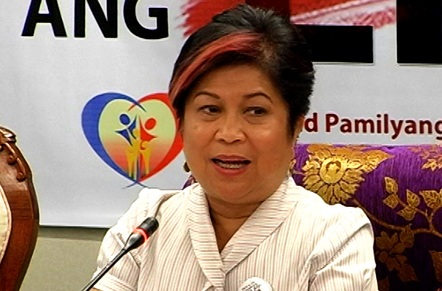Breaking
DSWD: Only 99 street families, children included in Batangas camp-out
MANILA — The Department of Social Welfare and Development (DSWD) reiterated Saturday that only 99 street families were actually included in the camp-out activity in a resort in Batangas.
DSWD Secretary Corazon J. Soliman clarified also that that there was no truth that some 500 street families and children were taken to the said camp-out activity.
Soliman also said that the families were not forcibly taken to Chateau Royal Resort in Batangas and such activity did not meant to hide the street children from Pope Francis.
Soliman said that the activity was regularly done since 2013 for street families and children that were impoverished and living in the streets so that they would be aware of the benefits and responsibility under the Modified Conditional Cash Transfer (MCCT) program for them.
Soliman said that in previous years, they usually conduct the activity in Island Cove in Cavite as proof that such was not done for the first time for disadvantage sectors of society.
MCCT is a version of Conditional Cash Transfer (CCT) which addresses the internally displaced people (under difficult situation) or those who do not have permanent homes and living in the carts or improvised house along the streets of highly urbanized cities.
The ultimate target of the program is to let the MCCT beneficiaries learn to live and appreciate the value of staying in a house rather than staying in the streets and be productive or has the capacity to earn a living for their family and sustain the rental fee.
The program piloted in 2013 and benefiting at present in NCR alone, more than 2,000 street families in coordination with the local government units (LGUs) who identify them.
Soliman further said that the activity was planned ahead of Papal five-day visit (Jan. 15-19) in the country and did not meant to hide the face of poverty among street children and their families.
She also explained that such activity was important to orient and prepare the street families on their roles in improving their relationships and lives and understanding also that “streets are not the best place for their children” since they were exposing themselves to dangers and wrong way of life.
The activity was also a way for the street children to open their eyes on the good side of practicing good grooming or body hygiene, protecting themselves from threats and society and understanding that finishing their education will be a way for them to improve their lives, she said.
The parents then were also oriented that they would be receiving cash grants under MCCT if they follow the conditions of sending their children to alternative learning system mode of education in public school and regular consultation to designated health centers.
Moreover, the parents were also briefed that they would be trained on livelihood formation to develop their earning capacity and be able to rent on their own later the small room or apartment that the agency pays for a period of six to 12 months for them through the MCCT program.
She admitted, however, the challenge that they face was difficulty to explain to some of the street families the essence of MCCT, as some really “get used” or comfortable on earning their living in the streets because many had been there for many generations and feel that it was easy for them to earn and live that way.
She appreciates however, the presence of some street families who see the MCCT program as their “fighting chance” to achieve the hope of change in their living conditions.
She strongly denied further that the accusations that the camp-out activity was conducted to hide the street children or the state of poverty and street children that the agency had been addressing for many years through poverty alleviation programs.
She added that one good side that should also be appreciated was the fact that through CCT (Conditional Cash Transfer) program, the children of the 4.2 million household beneficiaries were prevented from scattering in the streets and given chance to finish their studies and have better future.
“We know that poverty cannot be hidden and was seen himself by Pope Francis. We have no intention of hiding the street children and their families. The Pope had seen (the face of poverty) through the children under the care of Bahay Tuluyan Foundation and also in Tacloban (in case of survivors of typhoon Yolanda),” the DSWD chief said.
She said that the problem on street children was continuously jointly addressed by the agency in cooperation with the local government units (LGUs) and other non-governmental organizations (NGOs) and church or religious groups helping out through repetitive rescue of street children being reported at them through @savestreet twitter account of DSWD.
Some of the street children being rescued were returned to their families while those who were identified to be homeless were taken to the institutions and facilities where they could be taken cared of.
She said that the public could help a lot if they would not tolerate giving alms to the street children begging and instead switch the “help” or assistance to their trusted and duly accredited NGOs or faith based organizations that helps street children and families in some institutions like linkages to employment opportunities or trainings to make them more employable.
“The public must understand that there are correct ways of helping for if they will continue giving them alms through money as they begged in the streets they are encouraging and inviting them further to stay there,” she said.






















